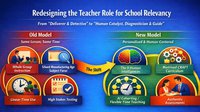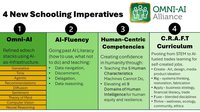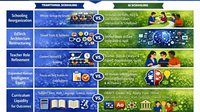In the current era marked by swift technological progress, concerns surrounding job displacement due to artificial intelligence (AI) have become a focal point of discussion. However, rather than succumbing to fear, individuals need to recognize the opportunities AI presents for personal and professional growth in the evolving job landscape.
The advent of AI has ushered in transformative tools, such as AI Companions and ChatGPT, showcasing unparalleled capabilities in understanding and processing information. While there’s a legitimate concern about the automation of many traditional roles, this shift also signifies a broader cultural and professional transformation. Individuals should not merely fear job loss but rather embrace the chance to evolve into more skilled content creators, strategists, and decision-makers.
Seizing Opportunities for Growth
AI’s efficiency in streamlining routine tasks offers a unique opportunity for individuals to redirect their focus towards more complex and intellectually stimulating endeavors. This efficiency could potentially elevate humanity’s ability to achieve seemingly insurmountable goals, from advancing space exploration to solving global issues like hunger and climate change. It’s crucial to view AI not as a threat but as a catalyst for personal and collective advancement.
To confidently navigate the AI-driven future, individuals can take proactive measures to enhance their understanding and application of AI technologies:
- Online Learning: Platforms like Coursera, edX, and Udemy provide a plethora of courses ranging from AI basics to advanced topics, allowing individuals to tailor their learning journey according to their pace and preferences.
- AI Literature Immersion : Beyond the basics, engaging with AI literature and research papers can provide deeper insights into the intricacies of the field. Titles like Melanie Mitchell’s “Artificial Intelligence: A Guide for Thinking Humans” offer accessible yet informative reads.
- Hands-On Experience: The real magic happens when theoretical knowledge is put into practice. Initiating AI projects, automating routine tasks, or exploring AI-driven creative arts on platforms like Kaggle can solidify understanding and foster innovation.
- Community Engagement: Connecting with the vibrant AI community through meetups, webinars, and conferences is not just about learning; it’s an opportunity to share experiences, gain inspiration, and foster collaborative efforts.
- Continuous Growth: As AI continues to evolve, the learning journey should be ongoing. Advanced courses and degree programs can provide deeper dives into specific AI realms, be it ethics, robotics, or other specialized areas.
AI’s Impact on Business Evolution
The transformative effects of AI extend across various industries, revolutionizing traditional processes and enhancing capabilities:
- In healthcare, AI’s predictive analytics and diagnostic tools promise to revolutionize patient care and treatment methodologies.
- The finance sector witnesses a transformation in data processing and analysis, with customer interactions being redesigned based on AI insights to propel forward into the post-AI world.
- Education benefits from personalized learning experiences, content adaptation, and seamless resource discovery through the power of student data integration.
With AI reshaping job landscapes, professionals need to prioritize upskilling. AI literacy, understanding data analytics, and fostering a mindset for continuous learning become essential for thriving in the evolving workplace. This involves not only acquiring new technical skills but also cultivating soft skills crucial for effective collaboration in a data-driven environment.
Insights into AI Applications
AI’s influence extends into various domains, each application adding a layer of intelligence and adaptability, enabling more sophisticated, efficient, and personalized solutions. These applications not only streamline operations but also open new avenues for innovation and customer engagement.
- Data Analytics and Predictive Analytics: AI’s role in analyzing historical data for trends, patterns, and forecasting future events is pivotal for businesses seeking insights into market trends and customer behaviors.
- Sentiment Analysis and Real-Time Data Processing: Understanding customer sentiments through social media and processing real-time data from IoT devices are becoming integral for businesses to stay competitive and responsive.
- Engagement through Personalization: AI-driven customization of user experiences on websites, apps, or in marketing campaigns is redefining how businesses interact with their audience.
- Chatbots and Virtual Assistants: Implementing conversational AI for customer service, support, and interaction is not just about efficiency but also enhancing user experience.
- Content Generation and Product Design: AI algorithms are now creating written content, artwork, music, and even aiding in the design of new products by predicting trends and customer preferences.
- Automated Software Development: AI algorithms are increasingly assisting in code generation, testing, and debugging, revolutionizing software development processes.
Reports from The World Economic Forum and McKinsey Global Institute underscore the need for reskilling and upskilling to adapt to AI-driven changes:
- The World Economic Forum’s “The Future of Jobs 2023” Report: This report projects that at least 44 percent of workers will need reskilling or upskilling over the next five years to adapt to changes brought by AI and automation. This translates to about 71.4 million workers based on the current labor force size.
- McKinsey Global Institute’s Report on “Generative AI and the Future of Work in America”: Published in July 2023, this report suggests that up to 30 percent of hours currently worked across the US economy could be automated by 2030. However, it emphasizes that AI is more likely to enhance skills in certain fields rather than simply eliminate jobs. The report suggests a nuanced impact, with generative AI enhancing the way STEM, creative, and business professionals work.
Workforce Development and the Role of Educational Institutions:
As the job landscape undergoes significant transformations, workforce development becomes crucial on a larger scale. Employers need to shift their hiring approaches, focusing on skills and competencies rather than traditional credentials. The emphasis on workforce development is not just about sustaining existing jobs but also about recruiting from overlooked populations, such as rural workers and people with disabilities.
Educational institutions, particularly colleges and universities, find themselves in a strategic position to lead the re-skilling and up-skilling of the US labor force. As of November 2023, there are approximately 164 million individuals working in the US. According to the WEF data, this translates to 71.4 million workers needing reskilling or upskilling over the next five years.
Estimates on the number of workers needing reskilling or upskilling due to AI and automation vary across research sources. While the World Economic Forum projects 44 percent of workers requiring such training, other studies suggest even higher numbers, potentially reaching up to 100 million in the next decade.
The widespread introduction of AI is an inevitable force shaping the future of work. Embracing this force is not just about workplace survival; it’s about thriving in a landscape of unprecedented opportunities
Skills Future-Ready Employees Need:
To illustrate the necessary skills for future-ready employees, let’s consider the example of an HVAC technician. This example encompasses technical, soft, and additional areas of skill development required to navigate the evolving demands of the job:
Technical Skills:
- Data Literacy and Analysis: Understanding how data is collected, analyzed, and interpreted by AI systems is crucial for effective collaboration.
- Connectivity and Troubleshooting: As HVAC systems become more interconnected, technicians need expertise in troubleshooting network issues, diagnosing software problems, and performing basic cybersecurity maintenance.
- Understanding of AI Algorithms: A basic grasp of how AI algorithms work in HVAC applications, such as predictive maintenance, is beneficial for interpretation and troubleshooting.
- Programming and Scripting: Advanced technician roles might involve working with simple scripting languages or configuration tools to customize AI functionality.
Soft Skills:
- Critical Thinking and Problem-Solving: With AI handling routine tasks, technicians need to focus on higher-level problem-solving and analyzing complex data.
- Communication and Collaboration: Effective communication with AI systems and clear communication with clients regarding AI-driven insights are essential.
- Adaptability and Continuous Learning: The HVAC field is constantly evolving, and technicians need to be adaptable and embrace lifelong learning to keep up with new technologies.
Additional Areas:
- Understanding of Building Automation Systems (BAS): As AI integrates with BAS, technicians need a holistic understanding of both systems and their interactions.
- Calibration and Sensor Maintenance: Ensuring the accuracy and proper functioning of sensors and data input sources is crucial for reliable AI performance.
- Cybersecurity Awareness: Technicians need to be aware of potential cybersecurity threats and vulnerabilities in connected HVAC systems and take appropriate security measures.
Adapting to a Data-Driven Future: The overall shift towards data-driven, technology-powered HVAC systems necessitates a focus on adaptability, continuous learning, and a blend of technical and soft skills for future success. The intersection of AI with HVAC technology showcases how professionals in diverse fields can leverage AI to enhance their roles rather than fear displacement.
Final Thoughts
The widespread introduction of AI is an inevitable force shaping the future of work. Embracing this force is not just about workplace survival; it’s about thriving in a landscape of unprecedented opportunities. By prioritizing upskilling, fostering a continuous learning mindset, and leveraging AI as a tool for enhancement, individuals and businesses can navigate the evolving job landscape with confidence.
As a society, we have an opportunity to transform our communities, ushering in a new level of success for all. To realize this opportunity, business and industry, in collaboration with government and education, must begin to establish clear guardrails to protect safety and security, establish solid ethical and moral principles, and invest substantially in education and training. Our hope is business and industry leaders will join forces with the public sector to establish policies and programs to re-skill and up-skill the US Labor Force.
As we journey into this AI-powered era, the synergy between human intelligence and artificial intelligence becomes the key to unlocking new frontiers of innovation and progress.
About the Authors

Kiran Kodithala is a technology leader and a seasoned expert in the field of educational technology. As the founder and CEO of N2N Services Inc. since 2010, Kiran has been at the forefront of driving innovation in higher education through technology. With a career spanning over 25 years dedicated to the sector, he has established himself as a pivotal figure in transforming how educational institutions leverage technology for better outcomes. Under Kiran’s leadership, N2N Services Inc. has grown to become a leading integrator providing cutting-edge solutions to the challenges faced by educational institutions. His passion for integrating technology into education has led to the development of transformative products like Illuminate and LightLeap.ai. These innovative platforms embody his commitment to harnessing the power of AI and secure data integration to revolutionize educational institutions globally.











